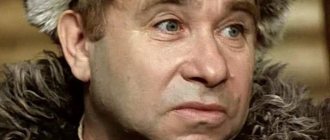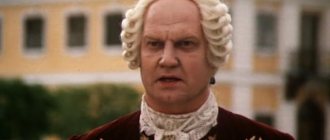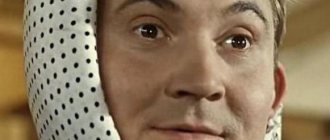His first childhood memory: how on his fourth birthday he and his father were walking through Sverdlovsk to a store for candy and then...
...suddenly a crowd of men with flags ran from the direction of Pavlik Morozov Park, they sang, danced, hugged, and jumped up. I asked: “Dad, has this war begun?” - “No, son. This pilot flew into space.”
Victor became a teacher, teaching children Russian language and literature all his life.
Poetry served in seclusion. Almost never published. Lavrov was not looking. He had readers only in his inner circle. He wrote by hand with an ink pen in large calico notebooks. He collected poems into handwritten books and bound them in several copies. I kept one copy for myself, and gave the others to three or four friends.
“Mytilene”, “Light Variations”, “Lilac”, “Pillar of Salt”, “Melting of Phlox”, “Haze of the North” - all these are the names of his handwritten books. The last book was Firefly.
One of his favorite poets was Batyushkov. They had a lot in common: poetics, structure of the soul, unpretentiousness in everyday life, belief in the holiness of the word. Following Batyushkov, Victor could repeat: “The most sad thing is to be cut off from literature, from the pursuits of the mind, from the sweet habits of life and from one’s friends...”
Thanks to Victor’s friends: recently a complete collection of poems by Victor Smirnov* was published in Yekaterinburg.
The preface to the book was written by the poet Oleg Dozmorov. This is what he recalls: “Victor is a most charming man, his appearance reminiscent of the artist Burkov, he spoke the language of Pushkin’s correspondence with Vyazemsky, with all these “my soul,” “the smoking room is alive,” and “on a short leg.” He called himself a bobak. Poems - plays. This was not stylization or mannerism - Vitya lived there at that time. Every time I came to him, he gave me some kind of book... Vitya’s house was a house of culture, conversations and poems under its roof - Ancient Greece, the birthplace of poets... Vitya never invented masculine virtues for himself and was all the more strikingly different from the supermanship of the Sverdlovsk poets. He didn’t break tabletops with a blow of his hand, didn’t jump from the third floor on a dare, but always sincerely admired the exploits of others, hesitated and seemed to exclude himself from the competition in advance. He was who he is - a school teacher and poet by the grace of God..."
Victor admitted: “I write as God puts it on my soul...”
Write to Dmitry Shevarov
From the poems of Viktor Smirnov
Theater
After college, Viktor Smirnov was invited to work at the Penza Drama Theater named after A.V. Lunacharsky. Our hero will stay within the walls of this institution for ten whole years. During all this time, he will play many interesting characters, including Claudius Goretsky (“Wolves and Sheep”), Othello (“Othello”), Melikhov (“Quiet Don”), “The Cause You Serve”, etc.
In 1983, creative changes took place in the biography of Viktor Smirnov: the actor left Penza and went to St. Petersburg, where he was accepted into the troupe of the Alexandria Theater. His debut in this theater was the role of Emelyan Pugachev (“The Captain’s Daughter”). Our hero coped with his role so well that he immediately became a favorite of the public.
In addition to “The Captain's Daughter”, the actor will take part in other equally popular productions of the Alexandria Theater: “The Power of Darkness”, “Sorry”, “Boris Godunov”, “Platonov”, “Woe from Wit”, etc.
Victor Smirnov
People's Artist of Russia (10/13/1992), leading actor of the Alexandrinsky Theater. Born on August 4, 1945 in the city of Klin, Moscow region. He began his career as a glass blower and participated in amateur performances. He graduated from the Gorky Theater School in 1972. And he was immediately hired by the Penza Regional Drama Theater named after. A.V. Lunacharsky. Over ten years of work on this stage, he played more than 40 roles. Among them: Cheshkov (“The Man from the Outside” by I. Dvoretsky, 1972), Admiral Stepanov (“The Cause You Serve” by Y. Herman, 1973), Boss Finley (“The Sweet-voiced Bird of Youth” by T. Williams, 1973), Claudius Goretsky (“Wolves and Sheep” by A.N. Ostrovsky, 1973), Lord Windermere (“Lady Windermere’s Fan” by O. Wilde, 1974), Busygin (“Date in the Suburbs” by A. Vampilova, 1974), Lopatin (“From Lopatin’s Notes” by K. Simonov, 1975), Anton Zykov (“The Zykovs” by M. Gorky, 1975), Mihai Gruja (“The Holy of Holies” by I. Drutse, 1976 g.), Grigory Melikhov (“Quiet Don” by M. Sholokhov, 1977), Nikitin (“The Shore” by Yu. Bondarev, 1978), Makar Nagulnov (“Virgin Soil Upturned” by M. Sholokhov, 1979), Ben Hubbard (“The Chanterelles” by L. Hellman, 1979), Othello (“Othello” by W. Shakespeare, 1982). In 1983, Viktor Smirnov was accepted into the troupe of the Leningrad Academic Drama Theater. Pushkin (now Alexandrinsky). His first work on the famous stage was the role of Pugachev in the legendary performance of Rostislav Goryaev “The Captain's Daughter” based on A.S. Pushkin (1984). This role brought the artist undoubted success and immediately promoted him to the ranks of the leading theater masters. In the series of subsequent works by Viktor Smirnov, there are no passing roles. In the 1980-1990s, the artist was involved in almost all major theater productions. Among his works: Zheleznov (“Vassa Zheleznova” by M. Gorky, 1985), Mitrich (“The Power of Darkness” by L.N. Tolstoy, 1986), Moskalev (“Uncle’s Dream” by F.M. Dostoevsky, 1987 .), Writer (“Suicide” by N. Erdman, 1988), Chaliapin (“Bells” by Yu. Nagibin, 1989), Skotinin (“Minor” by D. I. Fonvizin, 1990), Bolshov in comedy A.N. Ostrovsky's "Our people - we will be numbered!" (1990), Hamlet, and then Claudius (“Hamlet” by William Shakespeare, 1992 and 1997) Othello (“Othello” by William Shakespeare, 1993), Bugrov (“Platonov” by A.P. Chekhov, 1994), Chebutykin (“Three Sisters” by A.P. Chekhov, 1996), Famusov (“Woe from Wit” by A.S. Griboyedov, 1996), He (“Sorry...” A .Galina, 1996), Peter I (“The Tale of Tsar Peter and his murdered son Alexei” by F. Gorenstein, 1997), Scrambled Eggs (“Marriage” by N.V. Gogol, 1998), Chaliapin in the one-man play “Farewell, Russia !”, based on F.I. Chaliapin’s autobiographical prose “Mask and Soul” (1999), Patriarch (“Boris Godunov” by A.S. Pushkin, 1999), Don Luis (“Don Juan” by Moliere, 2000).
Powerful characters, extraordinary human destinies, a wide range of passions - all this is subject to such an extraordinary and powerful artist as Viktor Fedorovich Smirnov undoubtedly is. He has access to heroics, caustic satire, and roles from the love repertoire. An actor with a clearly defined theme of his own, Smirnov is at the same time a master of disguise. These qualities are in demand by directors of different generations and theater schools. Recently, the actor’s repertoire has included roles in plays by Alexander Galibin (Peter the Great in “The Tale of ...”, Scrambled Eggs in Gogol’s “The Marriage”), Alexander Belinsky (The Puppeteer in “Vanity Fair” by W. Thackeray, 2002), Vladimir Golub (Mamaev in comedy by A. N. Ostrovsky "For every wise man there is enough simplicity" (2002). About the role of Mamaev, theater critic Liliya Shitenburg wrote: "Viktor Smirnov demonstrates to the public another variation on the theme of the charming cannibal (Famusov is unforgettable). He smacks his wife’s hand with relish ", energetically pats Glumov's face and masters the nuances of Ostrovsky's juicy remarks in an unusually “delicious” manner. This artist is perhaps the last thing left in Alexandrinka that is “imperial”, large-scale and luxurious... He manages to be good-natured and grandiose at the same time."( L. Shitenburg “The Sage lacks simplicity” // Kommersant, No. 51, March 26, 2002. Viktor Smirnov’s major work was the role of judge Lyapkin-Tyapkin in Valery Fokin’s play “The Inspector General” (2002). In this performance the artist created a sharp, modern image of the smartest, most experienced official, an intriguer to the core, essentially the personification of the entire bureaucratic Russia. A new striking work was the role of Ivan Nikiforovich Dovgochkhun in the play “Ivans” based on “The Tale of How Ivan Ivanovich Quarreled with Ivan Nikiforovich” and other works by N.V. Gogol (director A. Moguchiy, 2007).
Filmography
In the biography of Viktor Smirnov, there was also a place for cinema. His first film work was the film “First Russians” by Alexander Ivanov and Evgeny Shiffers (1967). The film tells the story of the workers of the Narva outpost of Petrograd, who at the beginning of the 20th century came to Altai to build an agricultural commune.
It is also impossible not to note that together with our hero, other well-known actors took part in the film “First Russians”: Vladimir Chestnokov, Nikolai Muravyov, Ivan Krasko and others.
Unfortunately, the film by Alexander Ivanov and Evgeny Shiffers “First Russians” did not give Viktor Smirnov overwhelming popularity. Moreover, the actor would stop acting altogether until 1975. But after our hero’s filmography is replenished with a second film, his acting career will rapidly go up. By the way, Viktor Smirnov’s second film work was Veniamin Dorman’s film “The Lost Expedition.”
Throughout his acting career, our hero managed to star in several dozen films, among them:
- "Liquidation";
- "Mole";
- "Hope";
- "Steep";
- "National Security Agent 2";
- "Made in USSR";
- "Leningrad";
- "Cruel Time";
- "Olga and Konstantin";
- “Everyday life and holidays of Serafima Glyukina”;
- "Genius";
- "Alphonse" and others.
Episode King
The actor first tried his hand at cinema in 1967, playing a small role in the drama “First Russians”. Then he starred in the Soviet detective story “The Lost Expedition,” the adventure film “Golden River,” and the melodrama “Olga and Konstantin.”
Smirnov belonged to diverse actors, so he was invited to dramas, comedies, detective stories, adventure films, and historical paintings. There are not so many leading roles in his track record, but even from an episode, Viktor Smirnov was able to shine so brightly that the audience remembered his performance for a long time. The actor also found himself in demand in Russian cinema. His track record includes participation in:
- Streets of broken lamps;
- "Russian transit"
- Gangster Petersburg;
- Lethal force;
- "The Emperor's Love"
- "Black Crow";
- The Master and Margarita;
- Liquidation;
- "Mirror for a Hero";
- "Son of the Father of Nations."
For the last few years of his life, the actor resisted a serious illness, continuing to learn roles and go on stage. Being in the theater was not only his favorite pastime, but also an outlet that allowed him to forget about his own problems for a while.
On the night of August 12, 2020, Viktor Fedorovich left for other worlds. According to tradition, the actor was escorted on his final journey to applause. Viktor Smirnov was buried in the city on the Neva at the Serafimovskoye cemetery.
About personal
The personal life in the biography of actor Viktor Smirnov is very mysterious. And that's why. There is information that our today's hero was married twice: to Lydia Kvasnikova and Tamara Smirnova. However, what is most interesting is that some sources refute this information, believing that these women have nothing to do with the actor. This refutation is explained by the fact that due to the fact that the artist has fairly common initials, confusion occurred and the actor was assigned the wives of his full namesakes.
To the cinema
A wide range of television viewers recognize Smirny from the popular TV series “Gangster Petersburg-3” in the early 2000s, where he plays director Dmitry Burtsev. Everyone also knows Smirnov for his role as the head of the Odessa criminal investigation department in “Liquidation.” But this is far from his first attempt in the domestic film industry.
In the biography of actor Viktor Smirnov, his first appearance on screens occurred in 1967. It was a Soviet color film directed by Alexander Ivanov and Evgeny Shiffers - “Pervossiyan”. The film tells the story of the life and struggle of the first communes of Altai, who were destroyed by the Cossacks. After several years, Viktor Fedorovich did not act in films at all. And now in 1975 he finds himself on the set of “The Lost Expedition”. Here he plays a small role. By the way, Viktor Smirnov was rarely given leading roles, although he played even episodic ones with full dedication.
The filmography of Viktor Smirnov was replenished in 1980 with the film “A Sharp Turn” directed by Sergei Vysotsky. Again, the role is not the main one, which, unfortunately, is becoming a pattern for Viktor Fedorovich. He masterfully plays a supporting role in the fantastic feature film “Mirror for the Hero.” In this picture-parable, the action takes place in a small village in the Donbass. Smirnov plays the mine director Tyukin. The plot of the film is somewhat similar to the American melodrama “Groundhog Day” with Bill Murray in the title role. Everyone who knew Smirnov noted his excellent sense of humor. And in “Mirror...” Tyukin’s role is somewhat comical. Each time in a new scene when he met the hero, he had to behave exactly the same as in the first.
Viktor Fedorovich knew how to shine in every minor character, leaving no chance for critics not to notice him. After watching the film “Mirror for a Hero,” the director of the mine, smiling and dedicated to his work and the task of the party, will forever be remembered.
During his career in cinema, Viktor Fedorovich starred in 70 films, where even episodic, supporting roles in his performance are unique.
Interesting Facts
We talked about the biography and personal life of Viktor Smirnov. Now it's time for some interesting facts:
- For his services to culture and art, the actor was awarded several high awards, including “Honored Artist of the RSFSR”, “People’s Artist of the Russian Federation”, etc.
- The last few years of his life, the actor struggled with oncology, but despite this, he continued to work in the theater.
- The biography of Viktor Smirnov also included such a concept as “voicing”. The artist’s voice can be heard in the films “High Security Comedy”, “Prison Air”, etc.











